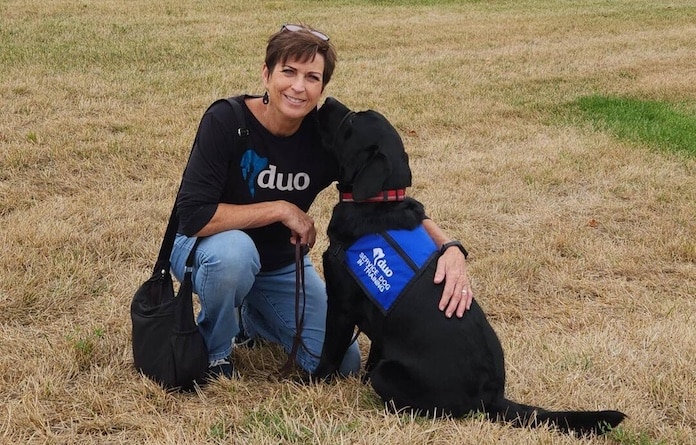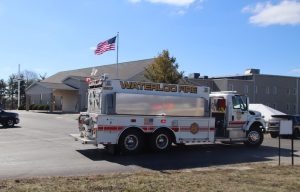Pooches providing support

A Waterloo dog owner recently concluded her work helping to train a puppy into a service animal, which is just part of her service with a St. Louis nonprofit focused on getting people connected with the canine care they need.
Audrey Kelly works as the administrative assistant for the Waterloo School District’s maintenance office, though much of her recent free time has been dedicated to working with dogs.
Things began with her own pooch, a golden-doodle named Doug she took to Duo Dogs in St. Louis for training to become a touch therapy dog.
Since then, Kelly and Doug have visited a variety of groups to help folks going through a difficult time feel a calming paw, whether they’re students who have gone through a traumatic experience, patients in hospitals or individuals in hospice care.
“I just have a love for dogs, and I have this awesome golden doodle named Doug who I decided to get trained through Duo,” Kelly said. “We go around to hospitals and schools, nursing homes, police stations, whoever invites us into their place to maybe help with stress relief.”
Touch therapy dog training is one of several services offered by Duo Dogs, who also notably offer general obedience training.
Duo Dogs CEO Dawn Van Houten offered some additional background on the organization, which began around 40 years ago as Support Dogs.
Originally focusing exclusively on breeding and raising support dogs, their work has broadened somewhat over the years particularly to also include the training of touch therapy dogs.
“Our core mission is to build extraordinary bonds between people and dogs to improve mental and physical well-being,” Houten said.
When it comes to Duo’s touch therapy training, Houten explained that volunteers like Kelly bring their own personal dogs in, at which point the animals undergoing plenty of temperament testing to gauge if they would work well as a touch therapy dog.
From there, the several weeks of training are intended for the pet just as much as the owner. Houten noted that, as the pair will be trusted to work with over 100 sites partnered with Duo, they need to know how to conduct themselves and what to expect when they visit.
“How you handle your dog in different situations, what you can expect if you visit a school and a bunch of kids start to swarm you and how do you handle that situation, there’s lots of training involved with that,” Houten said.
The touch therapy work is done on a volunteer basis, and though there’s plenty to do before a dog is properly considered for the role, it seems to be a very satisfying job for the roughly 300 pairs that do it.
Kelly spoke quite positively about her experience with Doug and the impact she’s seen him have on the folks they visit.
She recalled one instance of Doug “holding hands” with a patient as they were having a difficult time taking an IV. She also mentioned instances of Doug – a fairly large dog – being invited up onto the bed of hospice care patients.
Kelly also described how the mere presence of a touch therapy dog like Doug can work wonders on just about anyone when they visit.
“A lot of times, like if we go into Siteman (Cancer Center) or something, you think you’re there for the patients, but then you’ll walk by the nurse’s station, and they’ll turn around and get down on their hands and knees and start hugging your dog and tell you what a rough day, they maybe have lost a patient or something,” Kelly said. “Those moments have been very memorable.”
While Kelly has worked with Doug for a while, she’s also spent the past year and a half caring for Francis, a service dog who is now set to receive proper training as a service dog.
Houten also spoke about this key program in the organization, saying that Duo continues to breed and train dogs to provide to clients with a range of needs.
Some of these dogs go to folks who have trouble getting around, and others are given to individuals with hearing problems. Still others are provided to veterans with PTSD for the emotional support. Organizations like hospitals or schools can likewise receive dogs for therapy purposes.
As Houten explained, the program and these donations are all about increasing confidence, comfort and stability.
“A service dog can help that person with their level of confidence,” Houten said. “It can help them with their independence. For example, a service dog that’s helping a mobility client, perhaps that person now can live at home on their own without having caregivers with them 24/7 because the dog can help them do things that they can’t do themselves. The same type of independence and confidence that a hearing dog can give one of our hearing clients who would maybe not hear a phone ring or not hear a smoke alarm go off.”
When it comes to Kelly’s contribution, she is one of many volunteers who has opted to help raise a puppy several weeks after its birth.
Over the past few months, she’s had Francis constantly by her side, including during her time at the office – she voiced her thanks for her colleagues and Waterloo School District Maintenance Director Will Hulett for their patience.
Along with personally caring for him, she’s also brought him to Duo each week for training, though she explained that the training has largely been for her, getting Francis to improve his obedience and simple commands on a daily basis.
“It’s pretty much basic obedience what I have him do, heel, sit, listen, walk on a leash, potty train, maybe touch, different things that get him ready so, when he’s about 18 months, I return him back to Duo, and it’s like he goes off to college, but he actually stays there with them, and then they do advanced training,” Kelly said.
Like her experience working with Doug, Kelly was enthusiastic about her time with Francis, recalling fond memories like students behaving around him during school.
She was also pleased to be part of such a program, thinking about the role she’s played in ensuring that someone who needs him will have Francis for support in the future.
While she’s eager to hear about how and where Francis winds up, Kelly also acknowledged that there’s a sort of bittersweet feeling at spending so much time with a pup only to send him off quite recently.
“The day I had to return him, it was so, so hard, but I’ve just got to keep reminding myself of the bigger picture,” Kelly said.
Houten spoke further on the breeding and training program, noting that there are other, similar roles for volunteers, including acting as a pet-sitter for folks like Kelly when they have an emergency or otherwise have to step away from their future service dog.
Likewise, she spoke about how the puppies Duo breeds are constantly monitored and cared for, with volunteers needed for the time between their birth and when they’re handed off to another volunteer for their obedience training.
Houten also explained that these service dogs are sent to folks in need all around the country, though, Duo being the only organization of its kind in the region, they do try to make sure that priority is placed on folks around the St. Louis Metro area.
She also spoke about the sense of satisfaction she’s seen among the program’s volunteers.
“People like Audrey, who’s volunteering her own time, that provides, I think, fulfillment and joy for her,” Houten said. “That’s kind of part of the duo that we talk about here. It’s not just the dogs. It’s the person and the dog and what they can do together for others.”
When it comes to support for Duo Dogs, Houten said they are always in need of additional funding and gifts, though there is also a tremendous appreciation for program volunteers.
Kelly spoke highly of her experience with Duo, saying she hopes to continue working with them, and though she’s not taking on another dog like Francis right away, she plans to do so in the future.
She also voiced her encouragement for folks who think their well-mannered mutt might make for a good touch therapy dog.
“If anyone has a dog they think would be possibly a good touch-therapy dog, I would recommend checking out Duo and going through their training,” Kelly said. “It’s very rewarding. Not every dog is cut out for it, so if you think you’ve got one that would be, I don’t think you’d have any regrets.”
For more information on Duo Dogs, visit duodogs.org.






